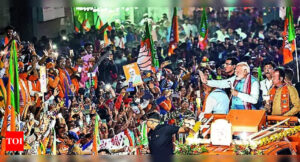Inclusive measure falls short, 5-day window for home voting regn leaves seniors shortchanged | India News

MUMBAI : Jimmy Dordi (85) was thrilled at the prospect of voting from home, a new EC initiative allowing seniors with limited mobility to participate in the democratic process without leaving their homes. But by the time he learned of the facility, the fiveday registration window slipped by, leaving him frustrated and unable to arrange for the paperwork in time. “The announcement came so suddenly. By the time I knew of it, I had no time to make arrangements,” Dordi shared from his Borivli room, where he’s largely confined to the bed and relies on a caregiver.
The sentiment is shared by many seniors for whom voting remains a cherished duty but find themselves cut off by circumstance rather than choice. “Last time, my son took me but now I can’t walk. Even an auto ride is impossible,” said Dordi.
For the first time, EC announced an at-home voting facility for citizens aged 85 and above for the LS polls this year, allowing them to cast a postal ballot. Many who long gave up hope of voting due to health issues took advantage of the opportunity. Officials visited their homes ahead of polling day to collect their votes. However, for the assembly polls, the short registration window—announced on Oct 22, with seniors and people with disabilities asked to register by Oct 27—left many struggling to complete the process for the inclusive measure in time.
As of Oct 15, the state has 9.6 crore registered voters, including 13.15 lakh aged 85 and above, with 56.3 per cent of them female and 43.8 per cent male. The aim, according to officials, is to boost voter turnout in the state and encourage every eligible voter to cast their ballot, with the hope that the voting percentage in Maharashtra will exceed 70 per cent.
When Yashwant Bagve (88), from Goregaon West, found out about the initiative, he was keen on using it but was frustrated by the tight dead line. “They only gave us five days. That’s not enough,” said Bagve, who lives alone and found that applying for the service was particularly challenging for seniors his age, who often struggle with mobility and other health issues.
As for his voting plans now, Bagve, who has osteoarthritis, isn’t certain. “I might still go out to vote if the polling station is accessible. But if it’s on an upper floor, it will be very tough,” he said. “See, we want to participate but they need to make it a bit easier for us,” said Bagve, hopeful that more seniors will be accommodated in future elections.
Andheri’s resident Chandrakant Doshi (89) plans to head to the polling station himself. “It’s close by, so I’ll manage,” he said confidently. But the at-home voting option, aservice his wife, Rama, has come to rely on, is more than a convenience or a civic duty; it’s about belonging to the community and a chance for seniors to stay engaged. “She’s 88, largely bedridden and doesn’t leave the house much anymore, but her right to vote is important to her, and she insisted on exercising it even if it had to be done right at home,” said Doshi, who is also working to spread the word to others in the community as head of a senior citizen activity centre in Andheri, where he regularly updates everyone on election facilities. “We’ve seen turnout drop over the years. So, facilities like this really help, especially for those who struggle to leave their homes.”
A key challenge with the rollout, said Prakash Borgaonkar, CEO of Aaji Care Sevak Foundation and veteran advocate for elderly welfare for nearly four decades, was lack of awareness and communication channels. “When I reached out to many senior citizens, some didn’t even know about this option. And those who did, struggled with the process,” he said, pointing at a common concern among seniors today—proper implementation of govt schemes.
“These are great ideas, but they need to materialize in real ways. For instance, a govt resolution was recently passed for Jestha Nagarik Mahamandal, a state senior citizens’ corporation, but when we followed up, it felt like just a pre-election formality. Nothing concrete on the ground,” said Borgaonkar, who is part of Maharashtra’s Joint Action Committee (JAC) comprising 26 organizations representing NGOs, researchers and gerontology experts. JAC has laid out an ambitious manifesto to reshape policies and programmes for senior citizens, who now make up nearly 12 per cent of Maharashtra’s population, and is proposing ‘councils’ at district and state levels with a mix of NGO members, academics and legal experts as well as seniors to keep these initiatives accountable.



